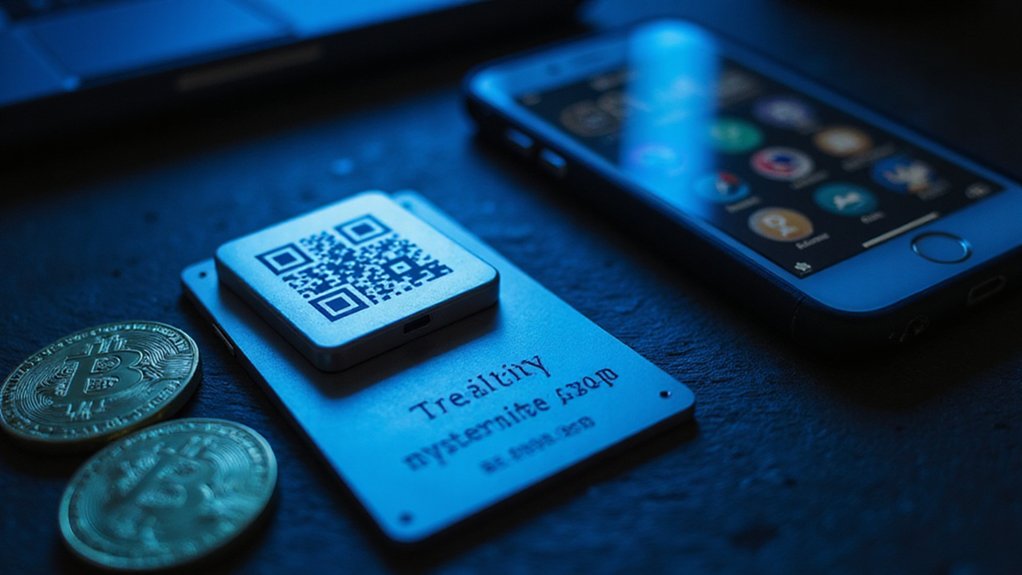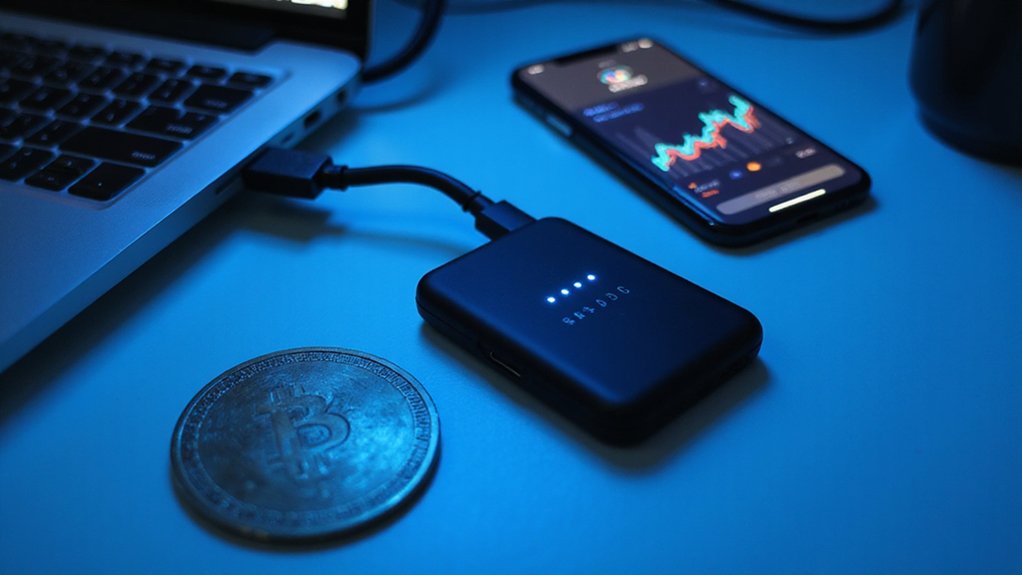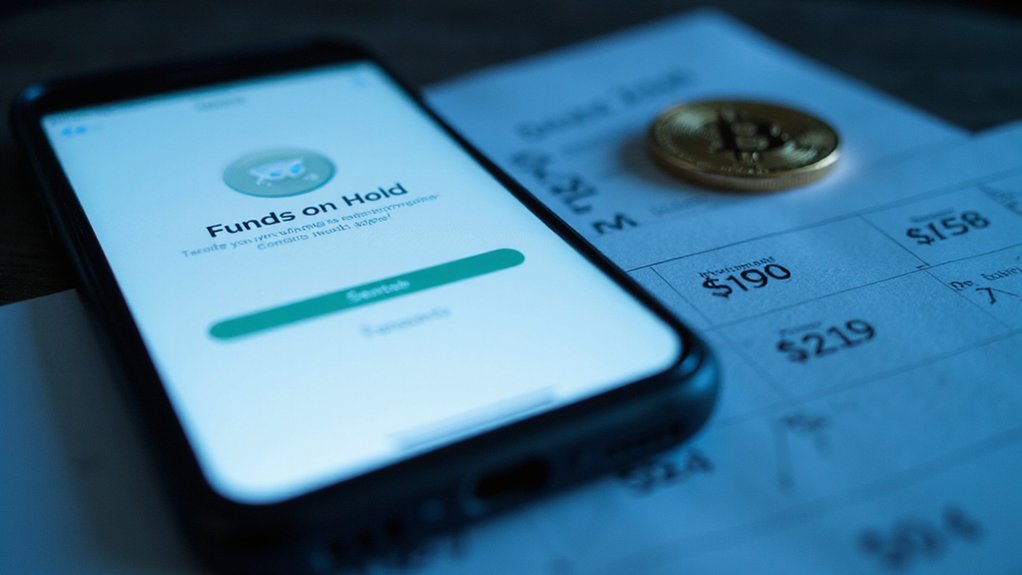A Bitcoin address is an alphanumeric string (spanning 26-35 characters) that functions as the digital equivalent of a bank account number in the cryptocurrency ecosystem. Generated for individual transactions and typically beginning with 1, 3, or bc1, these unique identifiers incorporate validation checksums to prevent sending funds into the void—though they can’t protect against typing a valid but incorrect destination, which results in permanent asset forfeiture. The blockchain’s immutable ledger awaits your first transaction.

A Bitcoin address, that seemingly inscrutable string of alphanumeric characters standing between users and the vast digital frontier of cryptocurrency transactions, functions as the cornerstone of Bitcoin’s operational framework.
Typically spanning between 26 and 35 characters in length, these unique identifiers serve as the digital equivalent of bank account numbers—albeit with considerably enhanced security features and, importantly, without the permanence that traditional financial systems have conditioned us to expect.
Unlike the checking account number you’ve memorized after years of repetitive use, Bitcoin addresses are often generated for single transactions and then discarded (a practice that would certainly bewilder conventional banking adherents).
These addresses represent the public half of an asymmetric cryptographic key pair, with their private counterparts jealously guarded by users who understand that exposure means instantaneous asset forfeiture.
The evolution from IP-based transactions to dedicated addresses marks one of Bitcoin’s earliest pivots toward enhanced security—a necessary adaptation in a system where rectifying erroneous transactions ranges from practically impossible to genuinely impossible.
When receiving Bitcoin, one simply provides their address to the sender, who inputs this string into their wallet software, initiating a transaction that, once confirmed by the decentralized network, becomes immutably recorded on the blockchain.
The P2PKH (pay to public key hash) format remains the standard address structure, incorporating validation checksums that prevent accidental transmission to nonexistent destinations.
However, these safeguards cannot protect against the more pernicious threat of valid but incorrect addresses—a scenario that has certainly contributed to the estimated millions of Bitcoin permanently lost in the digital ether.
For enhanced privacy and security management, users can generate multiple addresses through their wallet software, creating separate receiving points for different transactions. All legitimate Bitcoin addresses can be easily identified as they begin with specific prefixes like 1, 3, or bc1, distinguishing them from other cryptocurrency addresses. Despite their critical role in transactions, it’s important to understand that Bitcoin addresses cannot hold balance themselves, as this functionality belongs exclusively to digital wallets.
Mistyping or incorrectly entering a Bitcoin address can result in permanent fund loss, making extreme accuracy essential when initiating transactions.
Digital wallets handle the complex cryptographic operations required to create these addresses, relieving users of mathematical burdens while facilitating the peer-to-peer transactions that define Bitcoin’s revolutionary approach to financial exchange—transactions occurring without intermediaries, across borders, and beyond the reach of centralized authorities.
Frequently Asked Questions
How Do I Keep My Bitcoin Address Secure?
Securing a Bitcoin address requires multiple layers of defense—the digital equivalent of Fort Knox with a dash of paranoia.
Users should employ hardware wallets for offline key storage, enable two-factor authentication, avoid address reuse, and maintain encrypted backups in separate locations.
Cold storage solutions (keeping private keys entirely offline) represent the gold standard for significant holdings.
Regular security audits and vigilance against phishing attacks round out a thorough strategy that acknowledges cryptocurrency’s unforgiving nature—where mistakes, unlike traditional banking, rarely offer second chances.
Can I Reuse a Bitcoin Address for Multiple Transactions?
While technically feasible, reusing a Bitcoin address for multiple transactions is rather like posting your financial diary publicly while conveniently labeling it with your name.
Each reuse creates additional connections on the blockchain, potentially compromising privacy and heightening security risks.
Though convenient for static donation addresses, prudent users generate fresh addresses for each transaction—a practice supported by most modern wallets that automate this process, substantially reducing exposure to both tracking and cryptographic vulnerabilities.
What Happens if I Send Bitcoin to the Wrong Address?
Sending bitcoin to the wrong address effectively triggers digital finality—the irreversible nature of blockchain confirms the transaction’s permanence.
The outcome depends entirely on the address type: active wallets mean dependency on the recipient’s goodwill; burn addresses guarantee permanent loss; exchange-controlled addresses might offer slim recovery chances through support channels.
Unconfirmed transactions occasionally permit rescue via RBF or CPFP techniques, but once confirmed, bitcoin follows a one-way trajectory that even the most determined cannot reverse.
How Many Bitcoin Addresses Can One Wallet Have?
A modern Bitcoin wallet can house virtually unlimited addresses—a technical marvel that’s become standard fare in cryptocurrency management.
HD (Hierarchical Deterministic) wallets generate countless unique addresses from a single seed phrase, eliminating the antiquated need for individual backups.
Popular wallets like Exodus or Trezor automatically derive new addresses for each transaction, enhancing both privacy and organizational efficiency.
The theoretical maximum? Mathematically speaking, more addresses than atoms in the observable universe—rather excessive for even the most privacy-conscious user.
Can Bitcoin Addresses Be Traced Back to Their Owners?
Bitcoin addresses can be traced to owners through various methods—albeit with notable limitations.
While blockchain explorers expose transaction histories, investigators require additional techniques (clustering algorithms, OSINT, exchange KYC data) to connect addresses to identities.
The pseudonymous nature of Bitcoin means direct identification isn’t guaranteed, particularly when users employ privacy-enhancing tools like mixers or CoinJoin.
Law enforcement’s success typically hinges on correlating on-chain activity with external data points—a challenging proposition for those determined to maintain anonymity.









